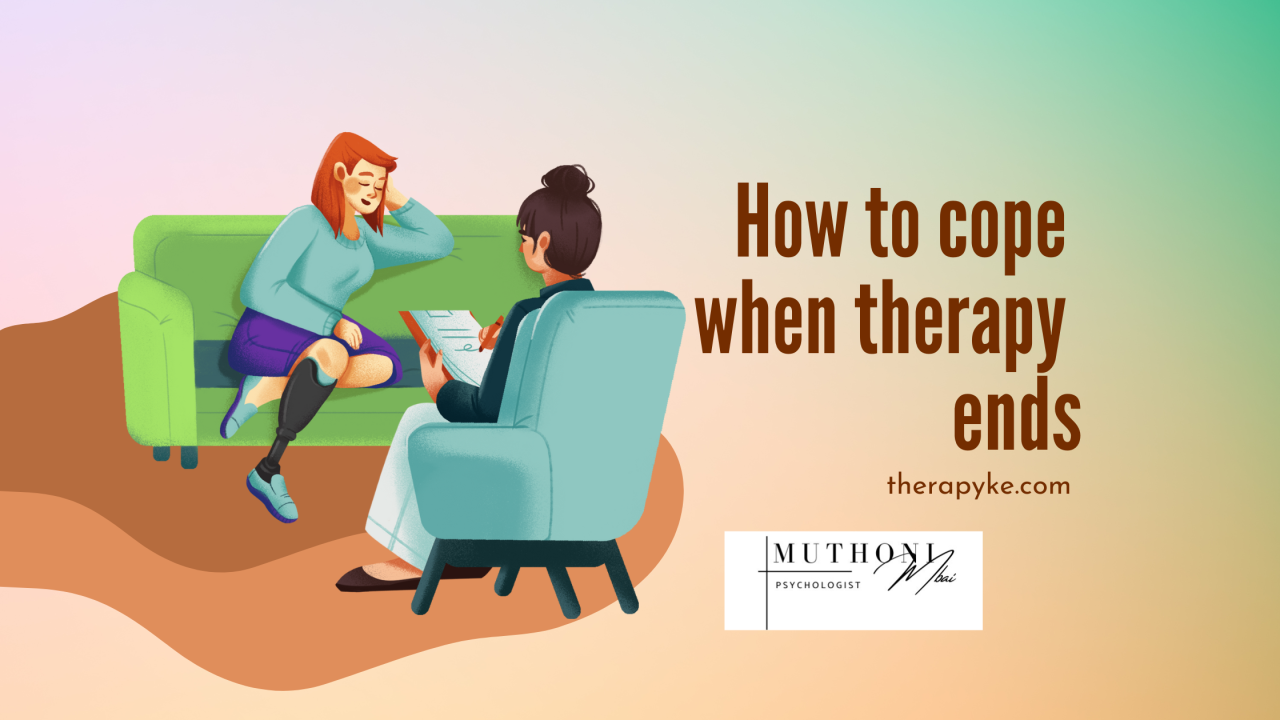
How to cope when therapy ends

‘Muthoni, I feel anxious. All this time I knew my sessions would come to an end at some point, but today, honestly, in as much as I knew it all this time, I still feel bad.’ She said.
I could feel some uncertainty amidst the vigor to go work on the practical steps and techniques that she had learned. “It’s a bittersweet experience”. On one hand, it’s a celebration of growth and progress. On the other, it’s natural to feel a sense of loss and apprehension.
‘What? You mean this is our second-last session?’ These phrase is not uncommon despite having prior notified the client that that could be the second-last session. Are you considering therapy, or are you anticipating the last session? Wondering how to cope when therapy ends? Read on!
How to Cope When Therapy Ends
Ending therapy can feel bittersweet. While it’s a sign of growth and progress, it can also bring a sense of loss. Coping effectively starts with preparation. Here are some strategies to make the transition smoother:
- Reflect on Your Journey
Take time to review the progress you’ve made. Reflecting on how far you’ve come and the challenges you’ve overcome can instill confidence. Consider journaling about key breakthroughs or memorable moments during therapy. Apps like Daylio can help you track your emotional journey and reflect on your growth over time. - Embrace Your Tools and Techniques
Therapy equips you with practical tools. Whether it’s mindfulness techniques, communication strategies, or coping mechanisms, trust in your ability to use them. Create a checklist of these tools as a reminder of your capacity to handle challenges. - Communicate Openly with Your Therapist
Don’t hesitate to share your concerns about therapy ending. Your therapist can provide reassurance and additional resources to support your transition. In my experience, clients who are able to share what they feel about ending therapy end up happier and more satisfied. - Develop a Self-Care Routine
Prioritize self-care. Activities like exercise, journaling, meditation, and spending time with loved ones can be grounding. - Plan for the Future
Having a plan for what’s next can ease the uncertainty. Set achievable goals that build on your therapy work, such as continuing personal development or joining a support group.
How to Deal with Ending Therapy
Dealing with the end of therapy involves recognizing that it’s a natural part of the process. Here’s how to navigate this phase:
- Acknowledge Your Feelings
It’s okay to feel sad, anxious, or even relieved. All these emotions are valid. Acknowledging them helps you process the transition. - Celebrate Your Achievements
Ending therapy doesn’t mean your growth stops. Celebrate milestones and appreciate the strength it took to seek help and engage fully in the process. - Maintain Support Systems
Lean on friends, family, or trusted mentors. Having a reliable support network can help bridge the gap left by your therapy sessions. - Keep Learning
Continue educating yourself about mental health. Books, podcasts, and online resources can offer new insights and tools.
How Do I Cope with My Therapist Leaving?
Therapist transitions can be challenging, especially if the bond was strong. Whether it’s due to relocation, retirement, or other circumstances, here are ways to cope:
- Seek Closure
Use your final sessions to express your feelings and gain closure. Ask questions, share memories, and discuss any lingering concerns. - Request Referrals
If needed, ask your therapist to recommend someone with a similar approach. Having continuity in care can ease the adjustment. - Focus on Continuity
Write down the techniques and insights you’ve gained. Keeping these handy ensures you’re not starting from scratch if you decide to see another therapist. - Reframe the Experience
Instead of viewing the therapist’s departure as a loss, see it as an opportunity to explore new perspectives with someone else.
What Is the Final Stage of Therapy?
The final stage of therapy is about consolidation and preparation for independence. It includes:
- Reviewing Progress
Together with your therapist, you’ll assess how your goals were met and what has improved. This review highlights your resilience and achievements. - Planning for the Future
Discuss what life after therapy will look like. This might include setting new goals, identifying potential challenges, and ensuring you have a plan for self-care. - Building Confidence
The final stage also focuses on empowering you to trust your ability to manage life’s ups and downs. Affirmations and practical steps can reinforce this confidence. - Creating a Supportive Environment
This might involve strengthening relationships, finding community support, or continuing with group therapy or workshops.
When You Feel Like Quitting Therapy
Sometimes, the urge to quit therapy arises before it’s time. Here’s how to navigate this:
- Examine the Reasons
Are you feeling stuck, overwhelmed, or frustrated? Discuss these feelings with your therapist. They might indicate an important area to explore rather than a sign to stop. - Recognize Plateaus
Progress in therapy isn’t always linear. Plateaus are normal and can be an opportunity to consolidate what you’ve learned. - Stay Committed to Your Goals
Revisit your reasons for starting therapy. Reflect on the goals you’ve set and the progress you’ve made. - Consider Taking a Break
If therapy feels overwhelming, a short break might be rejuvenating. However, discuss this with your therapist to ensure it’s a constructive step.
Therapy ending marks the start of a new chapter, not the end of your growth. By embracing the tools you’ve learned, maintaining your support systems, and staying open to future growth, you can confidently navigate this transition. Remember, support is always available, whether through friends, family, or resources like Therapyke.com. You’ve got this!



